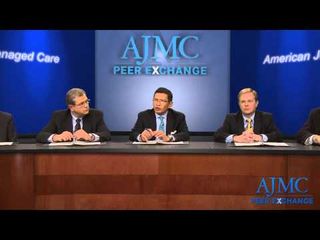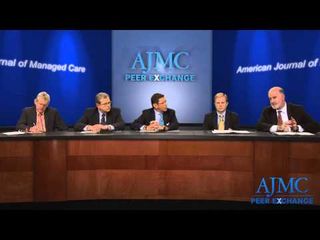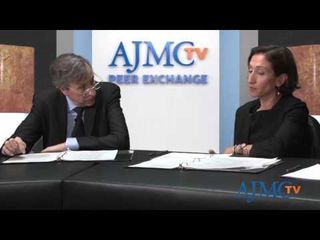
Oncology
Latest News
Latest Videos

CME Content
More News

As personalized medicine rapidly becomes an effective tool for combating cancer, payers are exploring new, value-based payment paradigms. These trends will soon intersect, and depending on how they are structured, the new payment models could accelerate or stifle personalized medicine's progress.

Results from the CHAARTED trial have found that 6 cycles of chemotherapy combined with ADT early in the treatment of metastatic prostate cancer significantly improved overall survival than with ADT alone.

A retrospective study in The Lancet Oncology has identified a strong correlation between reduced risk of endometrial cancer and oral contraceptive agents.

As clinical targets in more common malignancies emerge, testing and treatment options will increase. Balancing these choices with the high costs of new technology will be the challenge to ensure value in oncology care.

While scientists agree that NGS is the way of the future, payers are as yet apprehensive on the value afforded by the tests to clinical decisions.

In oncology, the shift from a "companion diagnostic" to a "companion therapeutic" paradigm is in high gear. While the noise and confusion is leading many payers to avoid coverage, they can benefit by proactively taking steps to integrate precision oncology to better manage quality, access, and cost of cancer care.

A research team at the Barts Cancer Institute in London has identified a 3-protein molecular signature in pancreatic cancer patients.

The discovery could lead to targeted therapy in triple negative breast cancer patients.

The introduction of biosimilars into the US market will not have a large impact on treatment costs until the volume of biosimiliars for different therapies increases, predicted Jennifer Malin, MD, medical director for oncology at Anthem.

A study published in JAMA Oncology presents a new tool that can predict disease recurrence in oropharyngeal cancer patients.

Urologists at Cancer Research UK have identified 5 distinct genomic signatures in prostate cancer that can have important implications on treatment decisions.

New research studies show that anti-inflammatory agents can improve survival as well as quality of life in cancer patients.

Physicians at the Brigham and Women's Hospital have published results from a proof-of-concept study that used mass spectrometry in almost real-time to detect and delineate pituitary tumors from normal tissue.

Two inexpensive generic drugs have been shown to reduce breast cancer deaths in postmenopausal women, according to studies published in The Lancet.

The California Department of Public Health has announced participation in a pilot project with St. Joseph Health to better understand cancer trends in California.

Before "value" became a cancer care buzzword, The American Journal of Managed Care was the first to create a conference where stakeholders discussed how to deliver the best care possible-and figure out how to pay for it. The fourth installment of Patient-Centered Oncology Care on November 19-20, 2015, in Baltimore, Maryland, will address the regulation of molecular diagnostics and ongoing efforts at payment reform.

This week Bristol-Myers Squibb's phase 3 nivolumab study ended early because renal cell carcinoma patients were experiencing significantly better overall survival, the American Society of Clinical Oncology called for the inclusion of more geriatric patients in trials, and Medicaid expansion states are finding more people enrolling than they planned.

End-stage cancer patients who were in general the healthiest and most active displayed worse quality of life signs in their last week of life when they were given palliative chemotherapy and there were no benefits to overall survival.

A study published in Nature Medicine has identified a gene signature that can predict cancer patient outcomes across a wide spectrum of malignancies.

Recent surveys have found that public sentiment on drug costs runs high and crosses the political divide. A move this week by the nation's leading oncologists to rein in therapy pricing may be a sign that this is the breakthrough issue of the presidential campaign.

A study in JAMA Oncology has found that chemotherapy for patients with end-stage cancer was associated with worse quality of life near death while they still retained their ability to perform many life functions.

While the study found differences in hazard ratio for age-specific survival, improved care and better treatment options might have resulted in increased survival, the authors deduce.

Advances in Precision Medicine, Discussions on "Value" Highlight Special Issue on 2015 ASCO Meeting
A special issue of Evidence-Based Oncology, a publication of The American Journal of Managed Care, covers clinical sessions, updates on new trial designs, and coverage of the discussion of "value" in cancer care from the 2015 meeting of the American Society of Clinical Oncology. The meeting took place May 29 to June 2, 2015, at Chicago's McCormick Convention Center.

ASCO's Breast Cancer Guideline Advisory Group and Clinical Practice Guideline Committee have published an updated guideline in the Journal of Clinical Oncology on using breast cancer biomarkers to guide clinical decisions when treating advanced metastatic breast cancer.

Zarxio (filgrastim-sndz), manufactured by Sandoz as a biosimilar to Amgen's Neupogen, has finally received marketing approval from a federal appeals court.














